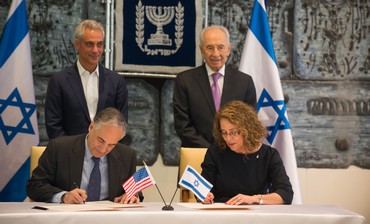Ben-Gurion University and the University of Chicago will be collaborating on joint research projects geared at solving the international water crisis.
The president of Ben-Gurion University and the University of Chicago have signed an agreement to engage in collaborative water research. This agreement is part of a joint Israeli-American effort to find a solution to the global water crisis by developing less expensive and more environmentally efficient water resources. BGU President Rivka Carmi stated, “The scarcity of water is a source of political crises [and] uncontrolled immigration. This is something central that the world is really looking at – providing inexpensive fresh water.”
WATER SCARCITY IS A MAJOR PROBLEM
Former UN Secretary General Boutros Boutros Ghali once said, “The next war in the Middle East will be over water, not politics.” Recently Egyptian President Morsi threatened to go to war with Ethiopia after Ethiopia decided to divert water from the Nile River in order to build a dam. Morsi said, “If it looses one drop, our blood is the alternative.” Ethiopia for its part has decided to build this dam in order to defy alongside other African countries what they perceive to be colonial-era treaties where Egypt and Sudan receive 87 percent of the water from the Nile, leaving other African countries the other 13 percent.
Egypt is just one example of how a water scarcity can lead to conflict. In Syria, a 2006 drought resulted in forcing many farmers to relocate to urban centers and there is some evidence that this reality helped to fuel the civil war within Syria. Closer to home for Israelis, the existence of a water crisis within the Holy Land has been another front fueling the Arab-Israeli conflict. While Israel managed to solve this problem with Jordan upon signing a peace treaty with the Hashemite Kingdom, this issue is far from resolved with the Palestinian Authority. For this reason, finding a solution to water scarcity problems is of utmost importance.
WORKING TOWARDS A SOLUTION
“BGU has been at the forefront of advanced basic and applied water related research for more than four decades and has developed a number of innovative technologies in the field,” Carmi claimed. A BGU professor was previously involved in helping India save a polluted river. Carmi explained, “The collaboration with the University of Chicago will result in the development of new technologies for the benefit of people all over the world.” University of Chicago President Robert Zimmer similarly emphasized, “Increasing both the quantity and quality of water is one of the major engineering challenges of the 21st century.”
He continued, “A collaborative research and technology center based in both Chicago and Be’ersheva focusing on the molecular aspects of water science and technology will result in a powerful new approach for addressing the various and pervasive challenges to the global water supply.” Leader of the Chicago side of the collaboration, Prof. Matthew Tirrell, claimed, “Water is the most fundamental molecule for sustaining all forms of life, but it is in dramatic short supply in many parts of the world. Water in all parts of the world face numerous threats, which in turn endanger human and economic health.”
Tirrell continued, “Such large-scale problems must be met by solutions developed from a comprehensive and integrated science and technology base of the type we establish between the University of Chicago and Ben-Gurion University.” Moshe Gottlieb, who is leading the collaboration at BGU, furthermore stated, “In this collaboration we intend to take advantage of the great strides achieved over the last decade in nanotechnology, materials science, biology, and chemistry at both institutions. These new tools and insights afford a molecular level approach to tackle an age-old human plight.” Upon the signing of the agreement, Israeli President Shimon Peres stated, “It will be a service to humanity, to individuals and to future generations.”
By Rachel Avraham, staff writer for United with Israel
